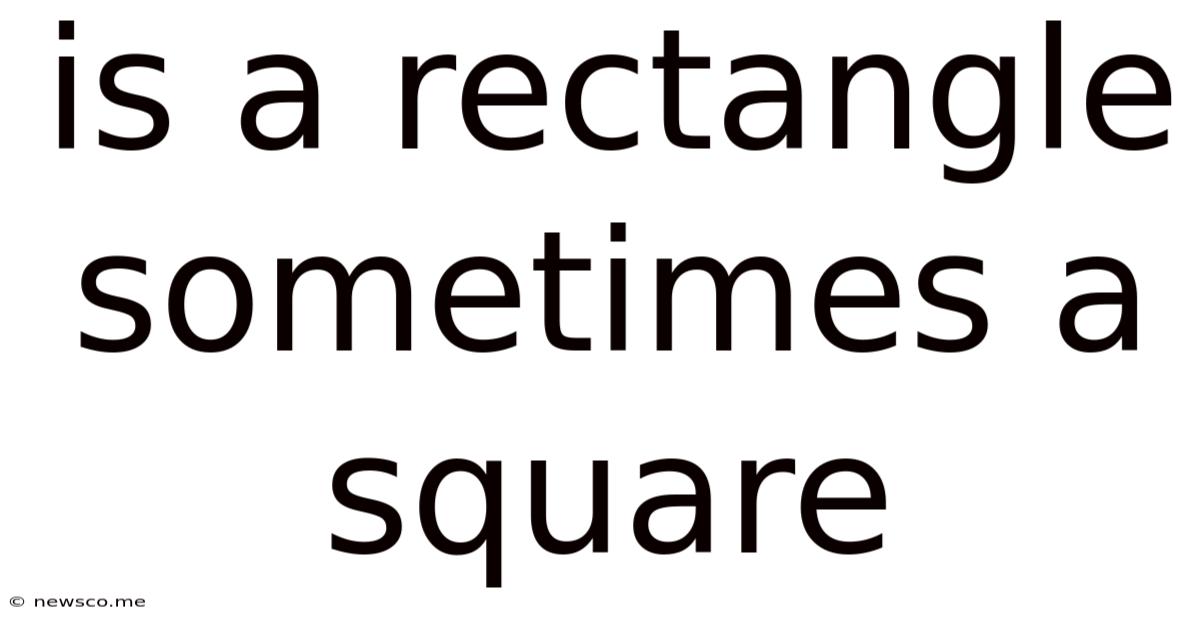Is A Rectangle Sometimes A Square
News Co
Mar 17, 2025 · 4 min read

Table of Contents
Is a Rectangle Sometimes a Square? Exploring the Relationship Between Rectangles and Squares
The question, "Is a rectangle sometimes a square?" might seem simple at first glance. After all, we all learned the basic shapes in elementary school. However, a deeper dive reveals a fascinating exploration of geometric definitions, set theory, and the nuances of mathematical classification. This article will delve into the intricacies of this question, clarifying the relationship between rectangles and squares, and exploring the broader implications of this geometric puzzle.
Understanding the Definitions: Rectangle vs. Square
Before we can definitively answer the question, we must establish clear definitions for both rectangles and squares. These definitions are crucial for understanding their relationship and avoiding ambiguity.
What is a Rectangle?
A rectangle is a quadrilateral (a four-sided polygon) with the following properties:
- Four right angles: Each of its interior angles measures 90 degrees.
- Opposite sides are equal and parallel: The lengths of opposite sides are equal, and these sides are parallel to each other.
What is a Square?
A square is also a quadrilateral, but with stricter requirements:
- Four right angles: Similar to a rectangle, it has four 90-degree angles.
- Four equal sides: All four sides are of equal length.
- Opposite sides are parallel: Like a rectangle, opposite sides are parallel.
The Key Difference and the Overlapping Properties
The key difference lies in the lengths of the sides. A rectangle only requires opposite sides to be equal, while a square demands all sides to be equal. This is the crucial distinction that leads to the answer to our central question.
Is a Rectangle Sometimes a Square? Yes!
The answer is a resounding yes. A square fulfills all the requirements of a rectangle. Since a square possesses four right angles and opposite sides that are both equal and parallel, it perfectly fits the definition of a rectangle. Therefore, a square can be considered a special case or a subset of a rectangle.
The Mathematical Perspective: Sets and Subsets
We can visualize this relationship using the concept of sets in mathematics. Imagine we have a set called "Rectangles" which contains all shapes that satisfy the definition of a rectangle. Within this larger set, we have a smaller subset called "Squares". This subset contains all shapes that satisfy the stricter definition of a square. Because every square is also a rectangle, the "Squares" subset is entirely contained within the "Rectangles" set.
Real-World Examples: Where Squares Act as Rectangles
The relationship between rectangles and squares isn't just a theoretical concept; it has practical implications in the real world. Consider the following examples:
- Building Construction: Many buildings utilize rectangular structures. A square building is simply a specific type of rectangular building, where the length and width are equal.
- Artwork and Design: Artists and designers often work with rectangles. A square canvas or a square design element is still a rectangle.
- Gaming and Programming: In video games and programming, squares are frequently represented as special cases of rectangles. Game engines often use rectangular coordinates to define objects, and squares are simply rectangles with equal sides.
- Everyday Objects: From books and tablets to window panes and tiles, many everyday objects are rectangular. Square objects are simply a specialized instance within this larger category.
The Importance of Precise Definitions in Mathematics
The rectangle/square relationship highlights the importance of precise definitions in mathematics. A subtle difference in definition can have significant consequences in classification and analysis. Understanding these nuances allows us to categorize shapes accurately and avoid logical inconsistencies. This principle extends beyond geometry to other areas of mathematics and logic, emphasizing the importance of clear and unambiguous language.
Exploring Further: Other Geometric Relationships
The relationship between rectangles and squares is just one example of the many overlapping relationships found in geometry. Similar relationships exist between other shapes:
- Rhombus and Square: A rhombus is a quadrilateral with all four sides equal in length. A square is a special type of rhombus that also has four right angles.
- Parallelogram and Rectangle: A parallelogram has opposite sides parallel and equal. A rectangle is a specific type of parallelogram with right angles.
- Trapezoid and Parallelogram: A trapezoid is a quadrilateral with at least one pair of parallel sides. A parallelogram is a special type of trapezoid with two pairs of parallel sides.
Understanding these intricate relationships enhances our geometric reasoning skills and expands our understanding of spatial relationships.
Conclusion: A Square is a Rectangle, Always
In conclusion, the answer to the question "Is a rectangle sometimes a square?" is unequivocally yes. A square is a special type of rectangle where all sides are equal. This relationship demonstrates the power of precise definitions and the beauty of the hierarchical organization found within mathematical concepts. It serves as a reminder of the importance of careful consideration and clear definitions in all fields of study, especially those dealing with logical classifications and structures. The intricate relationship between rectangles and squares transcends simple geometric definitions, offering insights into broader mathematical principles and real-world applications.
Latest Posts
Related Post
Thank you for visiting our website which covers about Is A Rectangle Sometimes A Square . We hope the information provided has been useful to you. Feel free to contact us if you have any questions or need further assistance. See you next time and don't miss to bookmark.